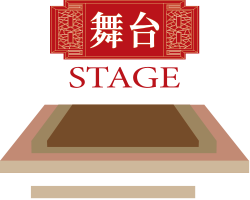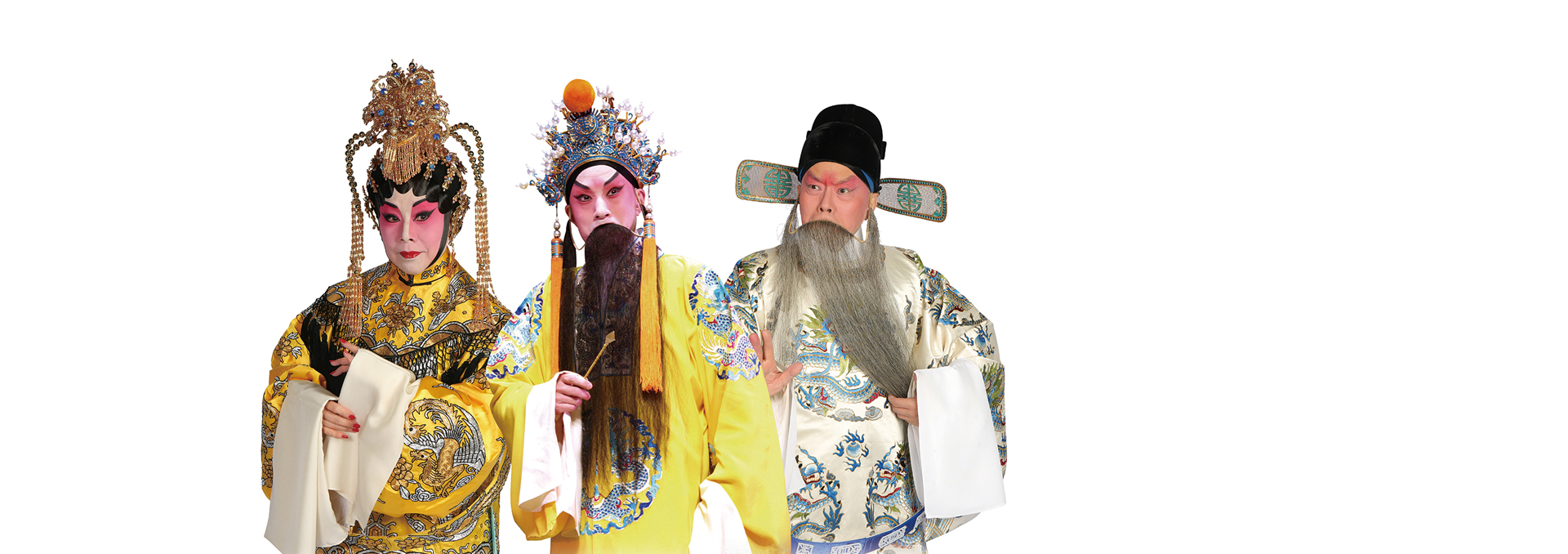
A New Cantonese Opera Battle of the Throne
Introduction
By the end of the Ming dynasty, two princes of Emperor Shenzong fighting for the throne. They shook the foundation of the empire and exposed the explicit and covert power struggles amongst royalties. The throne is at stake – should they follow heavenly laws or should they fight for it unscrupulously? Two brothers have become enemies because of the crown. How should the emperor father react?
The newly written Cantonese Opera production Battle of the Throne will be performed by renowned Cantonese Opera virtuosi Lee Lung, Nam Fung, Yuen Siu-fai, and Liu Kwok-sum, alongside the distinguished young cast of Lam Tin-yau, Lai Yiu-wai and Cheng Nga-kei. The internal conflicts, love and hatred of Emperor Shenzong of Ming, the cunning and insidious Consort Zheng and the loyalty of Liu Tingyuan towards his king will be shown on stage. The production is directed by National Class One Performer Geng Tianyuan, with script written by a rising star in Cantonese Opera Lai Yiu-wai. The audience will be delighted by a contemporary new classic performed in the format of traditional Cantonese opera.
A New Cantonese Opera Battle of the Throne
Director's Note
Geng Tianyuan
I made a promise with Mrs. To, that I would direct Battle of the Throne. Unexpectedly, I was diagnosed of an illness in late spring, and had been receiving treatment in Shanghai since then. During my recovery, I took the time to analyse the script and got my muse into gear. Yet, I was unable to return to Hong Kong and direct the production since I am still in the treatment during July and August. I find it quite a shame.
Mrs. To is ingenious. She and Christie went all the way to Shanghai and talked with me in person, recording each and every idea I had regarding the stage presentation, the behaviours of the characters, lighting and so on, so that Christie can rehearse with these notes in Hong Kong. Christie and the playwright Keith worked together before, and have quite many ideas about the play. Added with the heavyweight cast and the concerted efforts of the entire crew, I believe the production will see much success.
Speaking of Emperor Guangzhong, he was quite a poor person. He went through a lot of hardships before ascending to the throne. Yet, within less than a month, he died. He is historically known as the “month-old emperor” . Two of the three major suspicious cases in late Ming dynasty took place during his reign. The playwright Keith is particularly skilled with “Catching winds and shadows”. After studying cases and stories of power struggles in imperial courts and bloodshed killings across history and territories, he is able to rationalise and select from the intertwining aspects. And then come up with an epic story that does not only adhere to history, but also jumps out of conventions. His story is both familiar yet unfamiliar. Although there is no blood seen in this historic story of palatial battle of power, the horror still struck a chord of the audience’s heart, bringing them a novel theatrical experience.
“Catching winds and shadows” is an idiom from The History of the Former Han Dynasty written two thousand years ago, meaning “to do things which are unachievable” or “to act without grounds”. In the present world, both winds and shadows can already be captured. There is nothing vague about them. Only a wise playwright can capture clues in winds and shadows and interpret them cleverly.
A New Cantonese Opera Battle of the Throne
Librettist's Note
Keith Lai
Which type of Cantonese Opera play should I write for the Chinese Opera Festival? This was the question that I kept pondering before penning down the new script.
I broke the rules of the “six-pillar system” and chose a palace story. I tried to depict a battle for the throne—a narrative of deception and conflicts—instead of a story of sentimental romance. I tried to respond to our society with a variety of human nature without following the dichotomy of “black and white”. I kept the prevalent arrangement of no curtain-closing when the set is switched between scenes. In the singing segments, traditional banghuang and Guangdong xiaoqu are essential. In the scene of Burning the Palace, I attempted to create a stronger link between traditional paizi and the stage. I explored the evolution direction of erhuang. I preserved the use of traditional costumes in this play. I fused the performance techniques of traditional Cantonese Opera and the contemporary theatre. Featuring leading forerunners and young actors, the cast demonstrates a strong significance in passing down the torch. I am privileged to have invited Master Geng Tianyuan to offer guidance and directions on the overall interpretation and performance style. Lighting design is used to build up the ambience and atmosphere. The stage and props are primarily simplistic.
I want to show what exactly is contemporary Cantonese Opera in Hong Kong.
Let me express my gratitude to the Chinese Opera Festival, Master Geng Tianyuan, our fine cast of predecessors, peers, and young actors, as well as our backstage crew and everyone working on this production. Our thanks also go to the Cantonese Opera-goers of Hong Kong, who demonstrate their support by joining us at the theatre. Let us experience the charm of traditional Cantonese Opera and explore the unbounded possibilities in the development of the art form.
A New Cantonese Opera Battle of the Throne
Programme Details
Theatre, Ko Shan Theatre
Auditorium, Yuen Long Theatre
4-5/8 Fri-Sat 7:30pm
6/8 Sun 3:00pm
This palace play is set in the Wanli period when the Ming Emperor Shenzong is ruling the country. The Emperor is in two minds whether to make his elder or younger son the heir to the throne. Changluo, the elder son, fails to win his father’s favour. Changxun, the younger son born to Consort Zheng of the West Palace, is the Emperor adores. Veteran courtier Liu Tingyuan and his clique contend that the elder son should be enthroned in accordance with the ancestral rules. The Emperor feels the pressure and dares not do otherwise. Meanwhile, eunuch Pang Bao of the West Palace keeps his guard up as Changluo’s imminent return to the imperial court would certainly blight Changxun’s prospects as the successor. In his quest to get rid of Changluo, the eunuch sows discord by planting palace maid Qiuyue in between the siblings, before setting fire to Changluo’s abode, the Palace of Benevolent Bliss. The two siblings, as fate would have it, become embroiled in a heated struggle for the throne. As the ruling monarch, Shenzong has his personal love and hatred while facing immense pressure at the court. Who would he choose at the end?
Scene One The Royal Birthday
Consort Zheng is hosting a birthday banquet at the West Palace for Emperor Shenzong, who is delighted to receive a precious bow presented by Changxun, the son of Zheng. The eldest prince Changluo returns to the capital city after monitoring border affairs for three years as the banquet goes on. The Ministry of Rites has arranged Qiuyue to dance for the occasion. The brothers both fall in love with Qiuyue. Consort Zheng and her eunuch Pang Bao are anxious of the return of Changluo.
Scene Two Burning the Palace
Zhang Wu’ er, a mad man, burns down Ciqing Palace, where the eldest prince resides. Changxun rushes into the fire to save his brother. Liu Tingyuan captures Zhang Wu’ er; Qiuyue rescues Changluo. Both brothers are injured and sent to rest at the palace.
Scene Three Visiting the Patient
Consort Zheng visits her son Changxun and lies about the fire at Ciqing Palace, saying it was a plot made by Changluo, who has his eyes on the throne. As Changxun doubts about the story, Changluo comes to visit with some nourishing soup. Consort Zheng has the soup tested for poison, and the affirmative results convince Changxun about Changluo’s intention to snatch the throne from his hands.
Scene Four Naming the Crown Prince
Emperor Shenzong cannot make up his mind on the crown prince. Liu Tingyuan speaks candidly to the Emperor, quoting the ancestral practice of naming the eldest instead of the younger princes to inherit the throne. Emperor Shenzong accepts the advice. When the Emperor is about to name Changluo the crown prince, Changxun and Pang Bao arrive and speak ill of Changluo. In the end, Shenzong names his youngest son Changxun to be his successor. He also demotes Changluo and Tingyuan, demanding that neither of them should come to the palace without his consent. Knowing that her son is now the crown prince, Consort Zheng recites poems to provoke Changxun to eliminate Changluo to ensure the security of the throne.
–Intermission of 15 minutes –
Scene Five The Spring Hunt
During his spring hunt, Shenzong meets Changluo and Tingyuan. Changluo tells his father, the emperor, about how he has been framed. Shenzong is suspicious and makes up a story that Changluo has died from sickness. He wants to see how the West Palace reacts.
Scene Six The Sinful Consort
Qiuyue asks Changxun about the death of Changluo. Changxun is anxious and looks suspicious. Consort Zheng arrives and discusses with his son. Shenzong hears the conversation and learns about the assassination plot. He blames Consort Zheng furiously for leading Changxun onto the evil path. He finally names Changluo the crown prince.
Scene Seven The Enthronement
Changluo is ascending the throne. He meets Changxun again. The brothers recall the battle of the throne. Mixed feelings are invoked ……
Cast
Lee Lung: Emperor Shenzong
Nam Fung: Consort Zheng
Yuen Siu-fai: Liu Tingyuan
Liu Kwok-sum: Pang Bao
Lam Tin-yau: Changxun
Cheng Nga-kei: Qiuyue
Keith Lai: Changluo
Fu Shuwang: Zhang Wu’ er
A New Cantonese Opera Battle of the Throne
Production Team
Production: Super Talent International Limited
Coordinator: Marilyn To
Director: Geng Tianyuan
Script Advisor: Yuen Siu-fai
Playwright: Keith Lai
Assistant Director/Lighting Design: Christie Wing-sum To
Music Design: Janet Wong
Percussion Leader: Chan Siu-lung
Music Leader: Martin Lau
Stage Manager: Martin Cheng
Martial Arts Instructor: Hon Yin-ming
Set and Lighting: Kwong Hing Stage Scene Production Company
Costume and Props: Kam Yi Costumes Company
Choreography: Chan Ching-yiu
Image Photo: Martin Wong
House Programme Information and Surtitle Translation: Multilingual Translation Services
A New Cantonese Opera Battle of the Throne
Ticketing
Theatre, Ko Shan Theatre
4-5/8 Fri-Sat 7:30pm

 $380
$380  $280
$280  $200
$200  $120
$120
Auditorium, Yuen Long Theatre
6/8 Sun 3:00pm

 $340
$340  $220
$220  $120
$120
With Chinese and English surtitles
Please refer to the "Extension Activities" page for details of extension activities
The running time of each performance is approximately 3 hours and 30 minutes including an intermission of 15 minutes.
Programme Enquiries: 2268 7325
Ticketing Enquiries: 3761 6661
Credit Card Telephone Booking: 2111 5999
Internet Booking: www.urbtix.hk
Please click here for discount scheme details.








